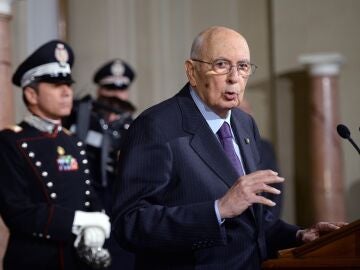
The two-time president of the Italian Republic, Giorgio Napolitano, known as ‘King Giorgio’ For all the occasions in which he had to guarantee the governability of the country with his continuous Government crises, he died today at the age of 98 in Rome.
Napolitano left active politics on January 15, 2015, when he resigned after almost nine years as president of the Italian Republic and two after having accepted a second term because the parties were unable to reach sufficient consensus to decide on a successor.
He thus became, at 88, the first president to repeat a term., which has now happened again with the current head of state, Sergio Mattarella, for the same reasons. Napolitano, who replaced Carlo Azeglio Ciampi on May 10, 2006, was elected again on April 20, 2013 and after his retirement he explained that he was going to dedicate himself fully to his family and, despite being a senator for life, few He was sometimes seen in the Chamber. During his 9 years as Head of State, “King Giorgio” had to unblock the paralysis of the Italian political system on several occasions.
He did so when Romano Prodi’s government coalition, El Olivo, fell in 2008, after months of faltering, motions of censure and withdrawals of confidence and he once again had to put an end to the crisis and call elections. But his great “coup” at a delicate moment for Italy was to push Silvio Berlusconi to resign in the face of the recession that the country was experiencing and opt for the technocratic route by placing Professor Mario Monti in power, with the support of Europe.
The Monti Government managed to undertake several public spending reduction plans and an adjustment plan of more than 30,000 million euros (November 2011-December 2012), complying with the maximum public deficit limit required by the European Union (EU). His hand did not tremble when the spokespersons of the House of Freedom, the coalition led by Berlusconi, in the Senate and the Chamber of Deputies met with him to ask him to grant clemency to the former prime minister for his conviction for tax fraud. that removed him from Parliament.
Napolitano affirmed that no request for mercy had been presented to him to which he had to respond, although he stressed that “regarding any final sentence, and the consequent obligation to apply it, nothing can be done but take note“.
Berlusconi refused to present the pardon request. Born on June 29, 1925 in Naples, Napolitano entered politics as soon as he graduated in Law in 1942 when he founded a communist and anti-fascist group that, during World War II, took part in numerous actions against the Nazis. A member since 1945 of the Italian Communist Party (PCI), he was elected deputy for the first time in 1953 and subsequently re-elected, except in the IV Legislature, until 1996, always for the Naples constituency. Two years later he resigned from office just the day after his break with the PCI at the historic Rimini congress in 1991, when Napolitano, one of the exponents of the moderate and social democratic current, moved to the Democratic Party of the Left.
He made the leap to Europe in 1992 as an MEP but returned to Italy after being elected president of the Chamber of Deputies on June 3 of that year, replacing Oscar Luigi Scalfaro. Romano Prodi appointed him Minister of the Interior in 1996, a position in which he remained until his resignation in October 1998. He returned to Europe in 1999 and until June 2004 he was President of the Constitutional Affairs Committee of the European Parliament.
A year later he was appointed senator for life by President Carlo Azeglio Ciampi, whom he replaced on May 10, 2006 with the support of 543 votes out of the 1,000 possible votes in the fourth vote, in which only a simple majority was needed. He was a personal friend of the Chilean poet Pablo Neruda and one of the personalities who in 1951 prevented the expulsion from Italy of the Nobel Prize winner in Literature and helped the publication of one of his capital works, “The Captain’s Verses.”
Source: Lasexta
Ricardo is a renowned author and journalist, known for his exceptional writing on top-news stories. He currently works as a writer at the 247 News Agency, where he is known for his ability to deliver breaking news and insightful analysis on the most pressing issues of the day.











